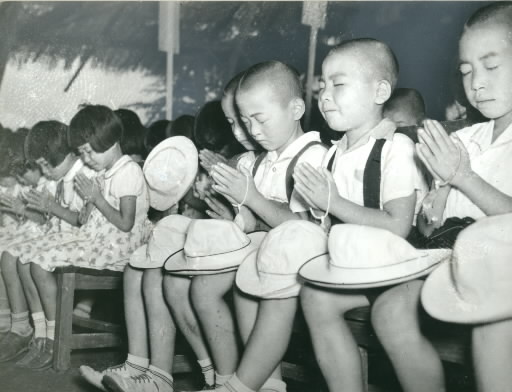The "Moral Adoption" of Hiroshima’s A-bomb Orphans, Part I [5]
Feb. 1, 2009
Prayers for peace in the shadow of the Korean War
by Akira Tashiro and Masami Nishimoto, Staff Reporters
“Now at this time John, our son, has not been called into active service. But I think he will be very soon. Some people think we should drop an atomic bomb. I do not. I pray that we will not and many other people pray as I do.” [By a housewife, on July 11, 1950]
The Korean War broke out on June 25, 1950. Two days later, the United States joined the war. A moral parent in the U.S. state of North Carolina wrote to her other “son,” a 14-year-old adopted child, about the escalation of the war and her concern about the use of an atomic bomb. Moral parents naturally presented their prayers for peace to their adopted children.
“We are very sorry about the war in Korea. Many of our people here in the United States wish that we would be helpful to other people in other lands instead of fighting against them. War always brings out the worst, as the U.S. dropped an atomic bomb on Hiroshima. I hope that the world will have peace soon.” [By a priest, on September 6, 1950]
As the Cold War between East and West heightened tensions further, the Korean War dragged on. In November 1950, then U.S. President Harry Truman indicated that he was considering the use of the atomic bomb in Korea. A year before, the Soviet Union had announced over Radio Moscow that it, too, possessed atomic bombs. Within the United States, people began to be more keenly aware of Hiroshima.
“On August 6, I thought about Hiroshima together with foreign students from a variety of countries. I hope that you and my daughter will one day join hands to realize a peaceful and happy world.” [By a housewife, on October 27, 1951]
The war in the neighboring country, for which Japan served as a base of operations, cast a shadow over the letters written by adopted children at the Hiroshima War Orphans Foster Home. A 14-year-old girl asked her moral mother questions in a letter in which she reported on a pleasant school trip:
“War is horrible. Houses are burned and people, more precious than houses, are burned to death due to war. I hate war. Why do we have to fight wars? When will war be abolished from this world?” [By a third-year junior high school student, on May 19, 1951]
A boy who entered the Buddhist priesthood when he was still under the care of the Hiroshima War Orphans Foster Home called on his moral parents to pray and shared with them the experience of war that he and the other orphans had endured:
“Nothing is more horrible than war. Our parents and siblings were killed in the atomic bombing. I believe that if you lost your children, you would miss them.” [By a third-year junior high school student, on March 5, 1951]
These children took part in the Peace Restoration Festival in 1946, the forerunner of the current Peace Memorial Ceremony, and continued to attend the peace ceremony every year to comfort the spirits of their departed fathers, mothers, and siblings. While they adored their moral parents across the sea and addressed them as “Father” and “Mother,” they were too young to write about their A-bomb experiences, which had robbed them of their loved ones in an instant and had left them with deep scars. An excerpt from one boy’s school composition will offer a glimpse into their lingering pain:
“When the Peace Bell was rung at 8:15 a.m., we all stood up, straightened ourselves, vowed to live calmly, powerfully, earnestly, and rightly, then prayed for peace and happiness. When I lifted my head, clouds of smoke were rising from incense sticks. My head felt heavier and my heart was filled with sorrow. ... I took a bus back to the children’s home and spent the rest of the day there quietly. In the evening, I visited the main building of a temple, calmed myself, and prayed for the souls of my mother and father. And so I managed another memorial day on August 6, 1951.” [By a first-year junior high school student, date unknown]
Keywords
Peace Memorial Ceremony
The Peace Memorial Ceremony began in 1946 as the Peace Restoration Festival, and changed its name the following year to the Hiroshima Peace Festival. In 1950, the Korean War began and the Peace Festival was canceled in connection with the occupation policy. In 1951, the festival again changed its name to the Peace Commemoration Ceremony. A U.S. plane dropped a bouquet of flowers on the ceremony venue during the Peace Commemoration Ceremony in 1951. In 1968, the name of the ceremony was changed to the Peace Memorial Ceremony.
(Originally published on July 18, 1988)








